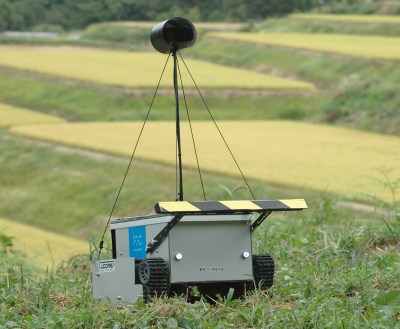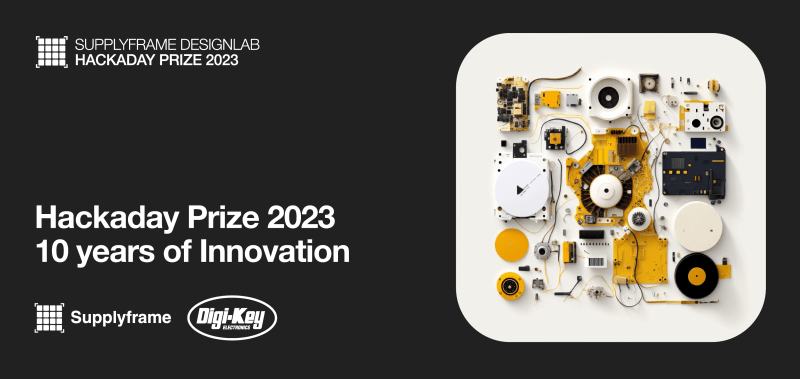We’re in the endgame now — there’s just about a month to go before the final results are announced for the 2023 Hackaday Prize, which means all of our finalists are in a mad rush to put the finishing touches on their respective projects. Today, ten more hackers are about to feel the heat as we announce our final group of finalists from the Save the World Wildcard round.
As finalists, each of these projects has been awarded $500 to help further their development. But perhaps more importantly, they are now officially in the running for one of the final six awards, which includes the Grand Prize of $50,000 and a residency at the Supplyframe DesignLab.
Robots to the Rescue
Just because we called it the “Save the World Wildcard” doesn’t mean an entry had to literally save the world single-highhandedly to qualify. If so, we probably would have offered more than 500 bucks. But as you might imagine, the projects which aimed to help improve the general state of things were certainly favorites among the judges.
With that in mind, it’s perhaps not so surprising that several of the finalists have immediate practical applications. The Agrofelis is as a low-cost programmable agricultural robot that could perform various tasks on farms that are too small for the sort of heavier automation hardware currently on the market. Built with relatively common components and tools, the bot can perform many tasks, such as mowing, spraying, and spreading seeds or fertilizers. It can even be modified for firefighting — a capability which is likely to become only more important in the coming years.
 The Roktrack from [Yuta Suito] is another agricultural robot, but one with a more tightly defined scope. This small autonomous mower is designed to cut down weeds that can choke rice crops, but could be put to use in any area that could stand for some automatic trimming. The bot’s Raspberry Pi and camera are used to visually identify pylons that mark the outline of the area in which it is to operate, and can also be used to spot people and animals that may wander by.
The Roktrack from [Yuta Suito] is another agricultural robot, but one with a more tightly defined scope. This small autonomous mower is designed to cut down weeds that can choke rice crops, but could be put to use in any area that could stand for some automatic trimming. The bot’s Raspberry Pi and camera are used to visually identify pylons that mark the outline of the area in which it is to operate, and can also be used to spot people and animals that may wander by.
Of course, you don’t need to have a farm to benefit from a domestic robot. When medical issues prevented [cele9999] from being able to shovel snow in the winter, they designed SnowByte — a remote controlled rover that could do the work for them. Not only is SnowByte cheaper than what’s on the commercial market, the fact that it’s licensed under the Creative Commons means others can modify it for their own purposes without having to reinvent the wheel…or the tread, as the case may be.
Personalized Perfection
This round was also a great opportunity for hackers to show off their passion projects. As such, several of the finalists have a more personal feeling than a lot of what we’ve seen in the competition to date. But luckily for us, these creators have decided to share their designs with the rest of the class. So while some of these projects might have started their lives with a userbase of one, they’ve got the potential to spread out and improve the lives of others on a massive scale.
 Consider the Open Book by [Joey Castillo]. This fully open source e-reader is an exceptionally personal project in the sense that it allows the individual to build their own reading device and manage their library on their own terms; enabling all the benefits of digital books without a soulless megacorp looking over your shoulder.
Consider the Open Book by [Joey Castillo]. This fully open source e-reader is an exceptionally personal project in the sense that it allows the individual to build their own reading device and manage their library on their own terms; enabling all the benefits of digital books without a soulless megacorp looking over your shoulder.
Thanks to impeccable documentation, much of it literally written on the device’s PCB, it also provides an ideal platform to modify and extend for users with more specific needs. Perhaps most critically, as the Open Book has gone through several design revisions over the years, it’s been optimized to the point that it could be affordably put into small-scale production. One could imagine hackerspaces churning out Open Books, loading them up with public domain works, and distributing them throughout the community.
The aptly named FindMyCat also started from a very personal place — [Sahas Chitlange] wanted to find his cat. But finding the products on the market lacking, he set out to create a comprehensive open source solution that others can benefit from. The end result is an incredibly professional looking hardware and software platform that could easily pass for a commercial product, if it wasn’t for the fact that it’s all being given away for free.
Wildcard Finalists
- SnowByte RC Plow
- Roktrack – Pylon Guided Mower
- AutoDuct Smart Motorized Shutter
- The Open Book
- Generative kAiboard
- Non-Contact Touch Panel
- FindMyCat – The Open Source Pet Tracker
- Batteryless Supercapacitor Solar Speaker
- Long Range Weather Station
- Agrofelis Robot
The Final Countdown
With all five challenges of the 2023 Hackaday Prize now concluded, our finalists have the next few weeks to push their projects to the next level. From expanded documentation to improved hardware and software, the judges will be closely looking at the progress made on these projects right up to the last moment. After all the scores are tallied up, we’ll announce the winners of this year’s competition live during Hackaday Supercon on November 4th.
The Hackaday Prize wouldn’t be possible without the support of our sponsors, so we’d like to thank Supplyframe and DigiKey for helping us bring these incredible ideas to life. Good luck to all our finalists — we can’t wait to see who takes home the top honors in this year’s competition.


















> and can also be used to spot people and animals that may wonder by.
I’m wondering when we switched to ‘wonder’ to mean ‘wander’. :)
Thanks. :) Fixed.
We didn’t, but the robot omits the uninterested ones.
“Our finalists have the next few weeks to push their projects to the next level”
Isn’t the official deadline 10th of October?
+1 ?